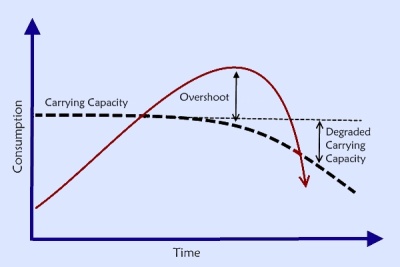We are currently 50% into overshoot (the world's average
ecological footprint is 2.7 gha/person, while the available biocapacity is 1.8 gha/person).
That 2.7 gha/person equates to an average material standard of living similar to Turkey.
In order to come out of an overshoot condition the average footprint would have to drop by 33% to 1.8 gha/person. That would imply a drop in the global average standard of living to the equivalent of Guatemala or Burma.
If we want to support 10 billion people sustainably, our average footprint would have to drop still further (since the planet's biocapacity isn't increasing the last I heard) - to around 1.25 gha/person. That implies the planet could support 10 billion people at an average material standard of living equivalent to Kyrgyzstan or Zimbabwe.
The average European footprint is around 6 gha/person, so the planet can currently accomodate about 2 billion people with an average European standard of living.
Of course to anyone with any ecological understanding, these calculations are wildly optimistic, because of the impact of overshoot on the carrying capacity of the system:

I just did a little thought experiment. The assumptions are:
1. The total biocapacity of the Earth drops by 20% over the next 40 years due to the degrading effects of overshoot.
2. The world population is about 7 billion in 2050, after peaking in about 2030 at 8.5 billion.
Under those assumptions, in 2050 the sustainable global average ecological footprint will be 1.4 gha/person, giving those 7 billion people the average material standard of living equivalent to Gabon or Vietnam today.
If the world population stays high, even trying to maintain (let alone improve) our average standard of living will continue to drive us deeper and deeper into overshoot, with ever worsening long term consequences.
On edit: Just to be clear, this is the path I think we will follow - driving ever deeper into overshoot until something serious breaks.